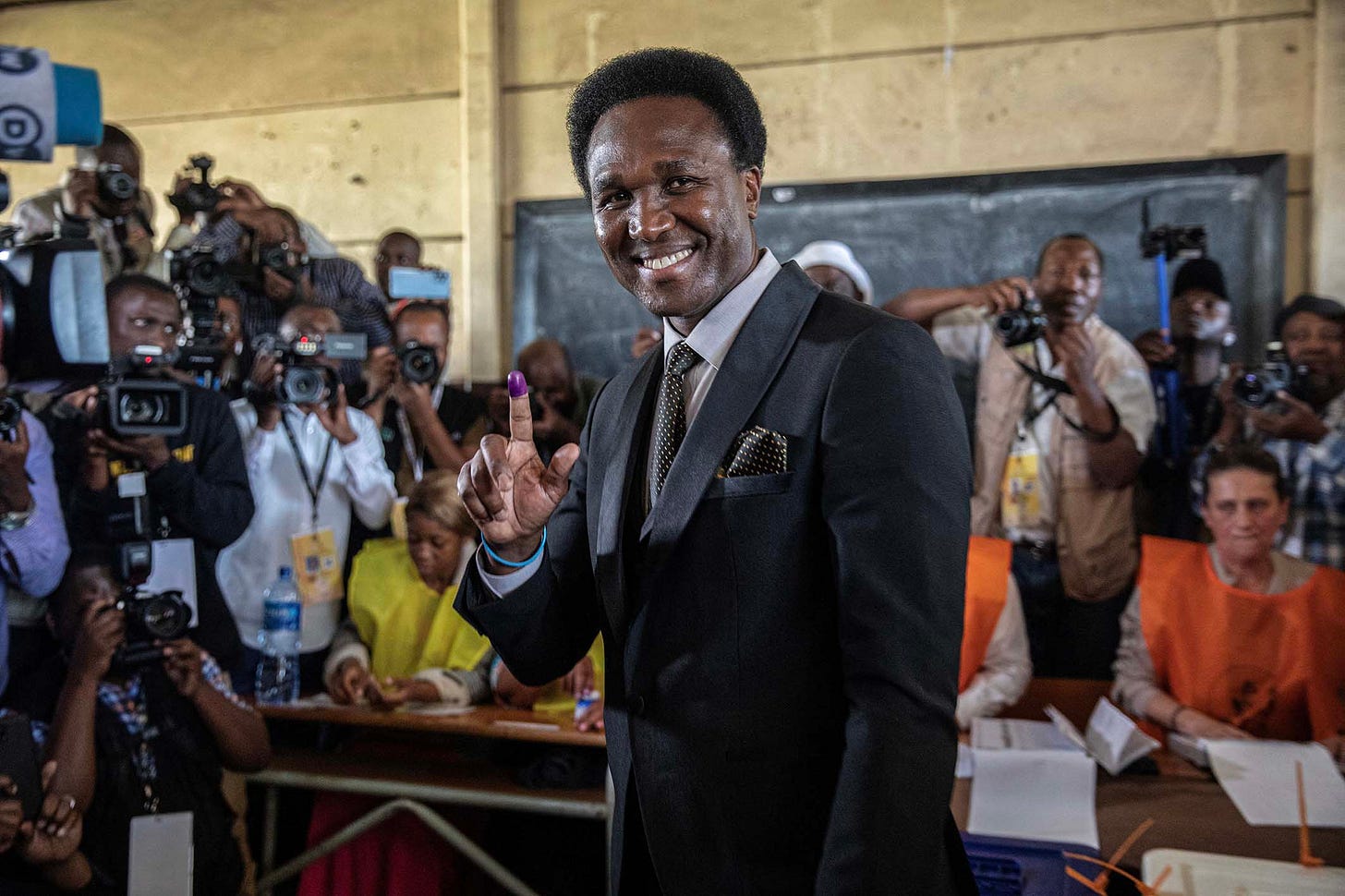Meet the man who probably should be Mozambique's president
Opposition leader Venâncio Mondlane claims to have won the presidential election last month. He’s probably right. But instead of preparing to take office, he has been forced to flee the country.
Luis Nhachote in Maputo

There is no familial relation between Venâncio Mondlane – the opposition leader who claims to have won last month’s presidential election – and Eduardo Mondlane, the revolutionary and liberation war hero who was assassinated before independence was achieved.
They just share a surname – and, in the younger Mondlane’s reading, a shared commitment to fighting against a corrupt and unjust political system.
Eduardo Mondlane’s assassination is one of the country’s greatest “what if” moments. How different might Mozambique be today if he had stayed alive to guide the country through its formative years? Could Frelimo, the political party that he founded, have become a party that served the people rather than an indifferent, corrupt elite?
In that hypothetical world, Venâncio Mondlane – the son of an ordinary Frelimo member, schooled on the values of Samora Machel – would probably be a senior figure within the ruling party, which has governed Mozambique since independence without interruption. Instead, he is trying to topple it – and coming closer to doing so than anyone else before.
“After the assassination of Eduardo Mondlane in 1969, they didn’t imagine that a ‘Mondlanito’ would emerge 55 years later,” said Venâncio, while on the campaign trail in Zambezia province prior to the 9 October election.
This prompted Eduardo Mondlane’s family to issue a stern rebuke against the “improper use” of his name by “some citizens, in bad faith and for purely electoral purposes”.
Nonetheless, over the past few months, “Mondlanito” – more commonly known by his moniker VM7, styled after Portuguese superstar Cristiano Ronaldo – has led a wave of popular resistance against Frelimo’s leadership.
It began with crowded campaign rallies all over the country, which resulted in a strong showing for his Podemos party on election day. Just how strong is a matter of deadly debate.
The electoral commission gave Frelimo candidate Daniel Chapo more than 70% of the vote. But the opposition party’s tabulation, based on tallies from polling stations, suggests that Venâncio Mondlane won an outright majority and should be Mozambique’s next president.
Mondlane alleges that the result was rigged, and civil society groups have also raised concerns about electoral fraud.
Mondlane called for massive protests, and his call was heeded – hundreds of thousands of people have turned out nationwide, but especially in Maputo, to demonstrate against the official result.
In response, outgoing president Filipe Nyusi mobilised police and military. Civil society groups say that at least 40 people have been killed so far by security forces.
A political powerhouse
Venâncio Mondlane is a relative nobody. He did not grow up in the corridors of power, but in a poor suburb on the outskirts of Maputo. His family is from Lichinga in Niassa province, and his father was a businessman who rose through the ranks to become CEO of a large insurance company. Mondlane studied forestry at Eduardo Mondlane University – Mozambique’s largest and oldest tertiary institution.
He first made a public name for himself as a commentator, appearing regularly on TV panel shows and contributing columns to independent publications. His friendly, easygoing persona was complemented by a passion for politics.
Mondlane’s first foray into formal politics was in 2013, when he ran for mayor of Maputo on the ticket of the Movimento Democrático de Moçambique (MDM), which was at the time a relatively new opposition party.
He led the opposition coalition to its best-ever result, although the city remained under Frelimo control, and this marked him out as a rising star. Parliamentary positions followed, first with MDM and then with Renamo, the oldest and – until now – strongest opposition party.
But when Renamo declined to make him its presidential candidate, Mondlane joined the relatively minor Podemos party – and turned it into a political powerhouse.
This was in large part due to the force of his own personality, and his mastery of modern social media messaging. His regular “lives” on YouTube and Facebook, attract millions of views and have been instrumental in driving the post-election protests.
This online influence continued even when Mondlane was forced to flee into exile after receiving death threats – first to South Africa, and then to an undisclosed “part of the world”.
But perhaps the most significant explanation for Mondlane’s popularity is timing. After more than five decades of Frelimo rule, a brutal and interminable conflict in Cabo Delgado and billions of dollars wasted in brazen corruption scandals, the ruling party is less popular than it has ever been.
Mozambicans want real change – and, like Eduardo Mondlane before him, that is exactly what VM7 is offering.



